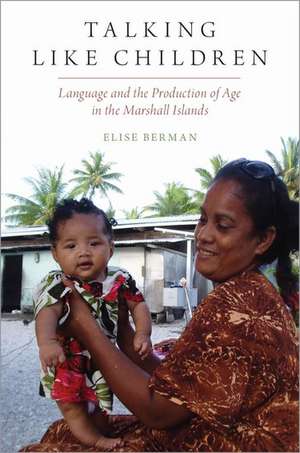Talking Like Children: Language and the Production of Age in the Marshall Islands: Oxf Studies in Anthropology of Language
Autor Elise Bermanen Limba Engleză Paperback – 21 mar 2019
| Toate formatele și edițiile | Preț | Express |
|---|---|---|
| Paperback (1) | 232.21 lei 31-37 zile | |
| Oxford University Press – 21 mar 2019 | 232.21 lei 31-37 zile | |
| Hardback (1) | 586.64 lei 31-37 zile | |
| Oxford University Press – 30 mai 2019 | 586.64 lei 31-37 zile |
Preț: 232.21 lei
Nou
Puncte Express: 348
Preț estimativ în valută:
44.44€ • 45.91$ • 36.98£
44.44€ • 45.91$ • 36.98£
Carte tipărită la comandă
Livrare economică 15-21 martie
Preluare comenzi: 021 569.72.76
Specificații
ISBN-13: 9780190876982
ISBN-10: 0190876980
Pagini: 224
Ilustrații: 26
Dimensiuni: 231 x 155 x 15 mm
Greutate: 0.54 kg
Editura: Oxford University Press
Colecția OUP USA
Seria Oxf Studies in Anthropology of Language
Locul publicării:New York, United States
ISBN-10: 0190876980
Pagini: 224
Ilustrații: 26
Dimensiuni: 231 x 155 x 15 mm
Greutate: 0.54 kg
Editura: Oxford University Press
Colecția OUP USA
Seria Oxf Studies in Anthropology of Language
Locul publicării:New York, United States
Recenzii
This excellent monograph engages critically with the theoretical literature on language socialization and the study of age through ethnographic exploration of village life in the Marshall Islands. Berman uses precise ethnolinguistic data to make her conceptual points and narrative threads to create coherence within and between chapters.
Recommended.
This book will be of interest to veteran ethnographers and linguists, especially those working in the area of language socialization and those engages in research related to the Pacific Islands, and it should also be required reading for students preparing to embark on their own ethnographic fieldwork.
We usually think of age, like race and gender, as biological but Elise Berman shows through this beautifully written book that age is actually produced by the ways elders interact with them. It knocked my theoretical socks off. It will do that to you too as you get to know these vivid individuals inhabiting a sliver of land on an atoll in the endangered Marshall Islands.
Berman has written one of the most compelling ethnographies of children's lives since Elinor Ochs and Bambi Schieffelin defined the study of language socialization for anthropology. Not only is Berman's ethnography a rich and poignant analysis of Marshallese social life, it is a monumental rethinking of age and its significance for practice and theory in the social sciences.
This is a remarkable book with a challenging thesis: that children are socialized to be different from adults. In other words, they learn to behave differently from adults through social interaction rather than being 'naturally' more naive. Beautifully written and clearly explained, this is both a neat theoretical intervention and a great book for the classroom.
Want to have your comfortable understanding of age shaken up? Read Elisa Berman's book! It challenges the ubiquitous idea of age being biologically determined. She shows how and why it's different elsewhere -- in this case on a tiny atoll in the Marshall Islands. You'll never again read social science that takes chronological age as an independent variable the same way. These are rather ideologies dressed as objective neutral facts about the world, and about human nature. Commonsense but unexamined assumptions about the naturalness of precise chronological age are actually ethnographically rare and historically recent.
Recommended.
This book will be of interest to veteran ethnographers and linguists, especially those working in the area of language socialization and those engages in research related to the Pacific Islands, and it should also be required reading for students preparing to embark on their own ethnographic fieldwork.
We usually think of age, like race and gender, as biological but Elise Berman shows through this beautifully written book that age is actually produced by the ways elders interact with them. It knocked my theoretical socks off. It will do that to you too as you get to know these vivid individuals inhabiting a sliver of land on an atoll in the endangered Marshall Islands.
Berman has written one of the most compelling ethnographies of children's lives since Elinor Ochs and Bambi Schieffelin defined the study of language socialization for anthropology. Not only is Berman's ethnography a rich and poignant analysis of Marshallese social life, it is a monumental rethinking of age and its significance for practice and theory in the social sciences.
This is a remarkable book with a challenging thesis: that children are socialized to be different from adults. In other words, they learn to behave differently from adults through social interaction rather than being 'naturally' more naive. Beautifully written and clearly explained, this is both a neat theoretical intervention and a great book for the classroom.
Want to have your comfortable understanding of age shaken up? Read Elisa Berman's book! It challenges the ubiquitous idea of age being biologically determined. She shows how and why it's different elsewhere -- in this case on a tiny atoll in the Marshall Islands. You'll never again read social science that takes chronological age as an independent variable the same way. These are rather ideologies dressed as objective neutral facts about the world, and about human nature. Commonsense but unexamined assumptions about the naturalness of precise chronological age are actually ethnographically rare and historically recent.
Notă biografică
Elise Berman is Assistant Professor of Anthropology at the University of North Carolina at Charlotte. She has spent more than two years living, teaching, and conducting research in the Marshall Islands, and earned her PhD in the department of Comparative Human Development at the University of Chicago. She has published in American Anthropologist, Journal of Linguistic Anthropology, Childhood, and Journal for the Scientific Study of Religion. She is currently working on a project on language, race, and education in the Marshallese diaspora.






